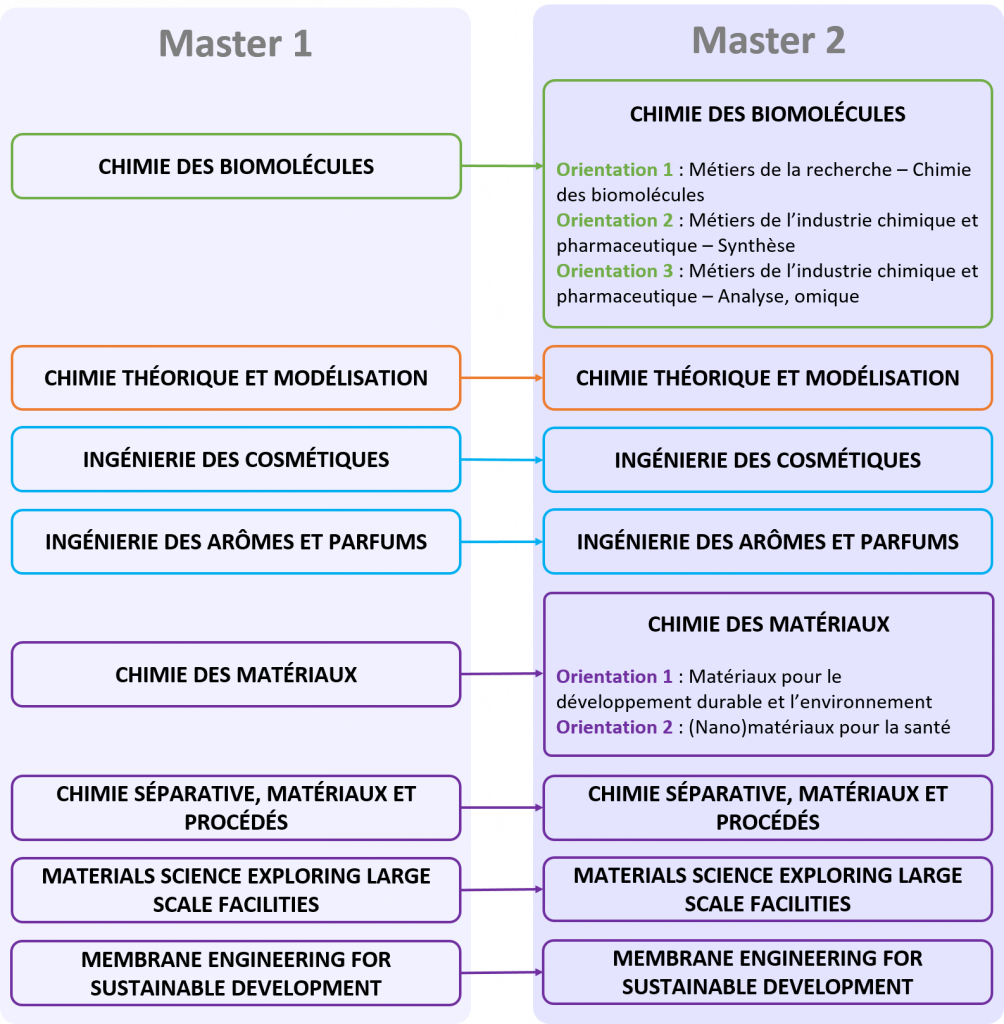Master's degree in chemistry
General presentation
The Master's degree in Chemistry is offered by the Chemistry Department of the Faculty of Science at the University of Montpellier. Our training is designed to meet the major challenges facing society and the expectations of industry in key sectors linked to chemistry and its branches, while taking into account their future development. The Master's program aims to provide skills in the latest developments in the design, synthesis, formulation and advanced characterization of (bio)materials and biomolecules, as well as flavors, fragrances and cosmetics.
Our training offer also guarantees an understanding of the phenomena behind their activity in targeted applications. To give our students the opportunity to specialize in a specific area of chemistry in line with local, national or international chemical activity, we offer a range of specialties enabling them to move into the following sectors: health, sustainable development and the environment, separative and nuclear chemistry, biomolecule and life chemistry, cosmetics, flavor and fragrance engineering, product and process analysis and control chemistry.
A research-based master's
Our training offer is based on the nationally and internationally recognized scientific excellence of the research teams at 4 research institutes: Institut des Biomolécules Max Mousseron; Institut Charles Gerhardt Montpellier; Institut Européen des Membranes; Institut de Chimie Séparative de Marcoule.
A shared master's degree
The Master's degree is shared with other educational establishments such as: Ecole Nationale Supérieure de Chimie de Montpellier; Institut National des Sciences et Technologies Nucléaires; Université Toulouse III-Paul Sabatier.
The routes

Biomolecule chemistry
This course offers multidisciplinary training in organic chemistry with a focus on life sciences. Teaching focuses on the synthesis, characterization and study of the biological properties of essential biomolecules such as nucleosides, oligonucleotides, saccharides, peptides, proteins and biopolymers.
Materials chemistry
This pathway offers training to acquire skills in the chemistry of materials and their interfaces, for research or industrial sectors concerned with sustainable development, energy, health and the environment. The course introduces the concepts and tools used in the design and development of various types of materials, their characterization and applications in the above-mentioned fields. The training received enables the integration of academic and industrial research.
Separative chemistry, materials and processes
This pathway introduces students to the concepts and tools used in solution chemistry, extraction and separation chemistry, elaboration and materials and process science, in the context of research and development activities, particularly in connection with the nuclear fuel cycle and the recycling of strategic metals.
Theoretical chemistry and modeling
Theoretical chemistry and molecular modeling play an increasingly important role in chemistry, biochemistry, physics and materials science. This discipline of chemistry provides conceptual tools, qualitative models and quantitative data that enable theoretical chemists to contribute to the development of innovative, tailor-made chemical systems.
Flavor and fragrance engineering
This 2-year course, divided into 4 semesters, is offered in partnership with industry to train high-level chemists specializing in the high-potential flavors and fragrances sector. From M1 onwards, the program is open to apprenticeships and double degrees with the IAE.
Cosmetics Engineering
The aim of this program is to train future engineers specializing in the interesting scientific fields of research and development for the cosmetics and well-being industries. The program is offered as an initial training course, with a 5-6 month internship per year, as well as a sandwich course. Recruitment is subject to selection.
Materials science exploring large scale facilities
This course in materials science is part of an international partnership between partner universities, industry and research centers. The curriculum delivers 120 ECTS credits, and courses are taught in English. It represents R&D in functional materials for energy storage and conversion, catalysis and thin films. It encourages industrial partners to access cutting-edge characterization supported by major instruments (neutron and synchrotron radiation).
Membrane Engineering for Sustainable Development
The 'membrane engineering for sustainable development' master's degree offers an advanced program in membrane science and engineering at the interface between materials science and chemical engineering, and focuses on specific applications such as energy, food, health and water. It is an Erasmus Mundus Master's degree.